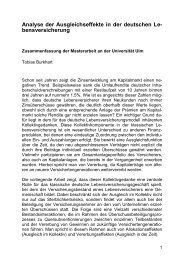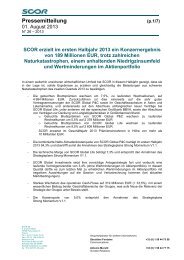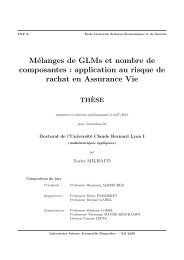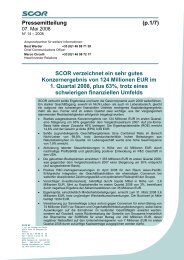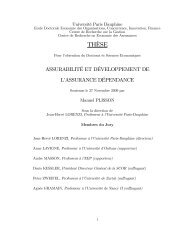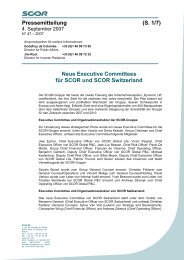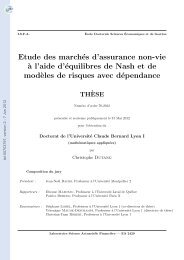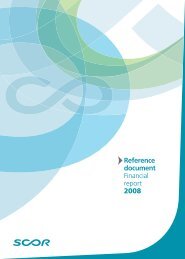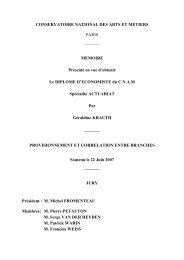4.4 Legal risk - Scor
4.4 Legal risk - Scor
4.4 Legal risk - Scor
You also want an ePaper? Increase the reach of your titles
YUMPU automatically turns print PDFs into web optimized ePapers that Google loves.
claims or surrenders of policies that could affect the current and future profitability of its business. Although written<br />
premiums have seen steady growth in prior years, a prolonged economic crisis could result in lower written premiums in<br />
the future. These adverse changes in the economy could affect earnings negatively and could have a material adverse<br />
effect on SCOR’s business, present and future revenues, net income, cash flows, financial position, and potentially, on<br />
the price of its securities.<br />
See “Appendix B – II. Internal control and <strong>risk</strong> management procedures, B. Identification and assessment of <strong>risk</strong>s” for<br />
further information on <strong>risk</strong> mitigation actions.<br />
Governmental initiatives intended to alleviate the financial crisis that have been adopted may not be effective<br />
and, in any event, are expected to be accompanied by other initiatives, including new capital requirements,<br />
fiscal or other regulations, that could materially affect SCOR’s results of operations, financial condition and<br />
liquidity in ways that it cannot predict<br />
In a number of countries in which the Group operates, legislation has been passed in an attempt to stabilize the financial<br />
markets, including bank stabilization programs by the Government and Bank of England in the U.K. and similar<br />
programs under the Emergency Economic Stabilization Act of 2008 in the U.S., as well as the Financial and Banking<br />
Regulation Act of 2010 in France and the Basel III agreements reached by the Basel Committee on Banking<br />
Supervision. Additionally, the EU has established the European Financial Stability Facility (EFSF) to assist European<br />
governments with their budgetary deficits and to stabilize the sovereign debt markets in the Euro-zone. Such legislation<br />
or similar proposals, as well as accompanying actions, such as monetary or fiscal actions, of comparable authorities in<br />
the U.S., U.K., Euro-zone and other countries, may fail to stabilize durably the financial markets. This legislation and<br />
other proposals or actions may also have other consequences, including material effects on interest rates and foreign<br />
exchange rates, and in particular the future viability of the European currency or the European Monetary Union, which<br />
could materially affect SCOR’s investments, results of operations and liquidity in ways that it cannot predict. The failure<br />
to effectively implement this legislation and related proposals or actions could also result in a material adverse effect,<br />
notably increased constraints on the liquidity available in the banking system and financial markets and increased<br />
pressure on stock prices, any of which could materially and adversely affect the Group’s results of operations, financial<br />
condition and liquidity. In the event of future material deterioration in business conditions, it may need to raise additional<br />
capital or consider other transactions to manage its capital position or liquidity.<br />
In addition, SCOR is subject to extensive laws and regulations that are administered and enforced by a number of<br />
different governmental authorities and non-governmental self-regulatory agencies, including the French prudential<br />
control Authority (Autorité de Contrôle Prudentiel, or “ACP”) which regulate among other categories of entities the<br />
insurance and reinsurance companies, and other regulators. Since the bigining of the 2007 financial crisis, some of<br />
these authorities are considering or may in the future consider enhanced or new regulatory requirements intended to<br />
prevent future crises or otherwise assure the stability of institutions under their supervision. These authorities may also<br />
seek to exercise their supervisory or enforcement authority in new or more assertive ways. All of these possibilities, if<br />
they occurred, could affect the way SCOR conducts its business and manages its capital, and may require it to satisfy<br />
increased capital requirements, any of which in turn could materially affect its business, present and future revenues, net<br />
income, cash flows, financial position, and potentially, the price of its securities.<br />
SCOR is exposed to uncertainty of the effects of emerging claim and coverage issues<br />
SCOR takes into consideration the numerous changes to the environment in which the Group operates, examples<br />
being : the professional practices, the legal, jurisdictional, regulatory, social, political, economic, financial and<br />
environmental conditions. These emerging or latent <strong>risk</strong>s may adversely affect SCOR’s business due to either an<br />
interpretation of the contracts leading to an extension of coverage beyond its underwriting anticipation (e.g. through<br />
inapplicability of treaty clauses) or by increasing the frequency and /or severity of claims. This would have an adverse<br />
effect on business, present and future revenues, net income, cash flows, financial position, and potentially, on the price<br />
of securities.<br />
See “Appendix B – II. Internal control and <strong>risk</strong> management procedures, B. Identification and assessment of <strong>risk</strong>s” for<br />
further information on <strong>risk</strong> mitigation actions.<br />
20



